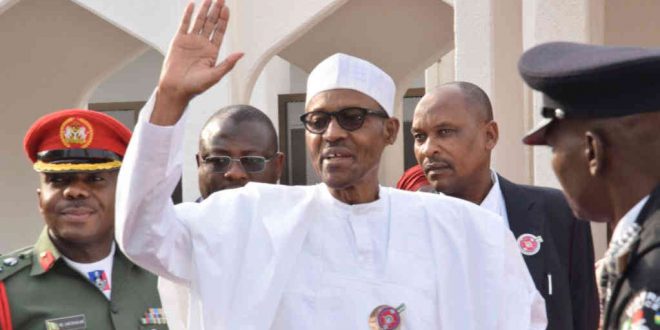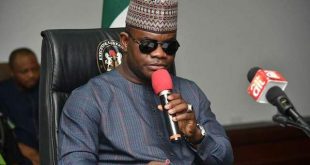EXECUTIVE CHAIRMAN OF THE EFCC
I am honoured to be given the privilege of presenting this paper at the Ambrose Alli Annual Lecture. The topic is apt, given the pedigree of the man in whose memory we have gathered here today. Distinguished audience, permit me to state that the “leader” is that “one who fosters change.” Therefore Leaders are not necessarily those who merely hold formal “leadership” positions. On the contrary, all people are potential leaders.
Following from the above, we can conclude that the conception of leadership comprises the following basic assumptions:
• Leadership is concerned with fostering change.
• Leadership is inherently value-based.
• All people are potential leaders.
• Leadership is a group process.
The UNDP defines governance as the exercise of economic, political and administrative authority to manage a country’s affairs at all levels. It comprises the mechanisms, processes and institutions through which citizens and groups articulate their interests, exercise their legal rights, meet their obligations and mediate their differences.
Good governance is, among other things, participatory, transparent and accountable. It is also effective and equitable. And it promotes the rule of law. Good governance ensures that political, social and economic priorities are based on broad consensus in society and that the voices of the poorest and the most vulnerable are heard in decision-making

over the allocation of resources
Governance the UNDP further notes has three legs: economic, political and administrative. Economic governance includes decision-making processes that affect a country’s economic activities and its relationships with other economies. It clearly has major implications for equity, poverty and quality of life. Political governance is the process of decision-making to formulate policy. Administrative governance is the system of policy implementation. Encompassing all three, good governance defines the processes and structures that guide political and socio-economic relationships.
The following are characteristics of good governance defined in societal terms;
• Participation – All men and women should have a voice in decision-making, either directly or through legitimate intermediate institutions that represent their interests. Such broad participation is built on freedom of association and speech, as well as capacities to participate constructively.
Rule of law – Legal frameworks should be fair and enforced impartially.
• Transparency – Transparency is built on the free flow of information. Processes, institutions and information are directly accessible to those concerned with them, and enough information is provided to understand and monitor them.
• Responsiveness – Institutions and processes try to serve all stakeholders.
• Consensus orientation – Good governance mediates differing interests to reach a broad consensus on what is in the best interests of the group and, where possible, on policies and procedures.
• Equity – All men and women have opportunities to improve or maintain their well-being.
• Effectiveness and efficiency – Processes and institutions produce results that meet needs while making the best use of resources.
• Accountability – Decision-makers in government, the private sector and civil society organisations are accountable to the public, as well as to institutional stakeholders.
• Strategic vision – Leaders and the public have a broad and long-term perspective on good governance and human development, along with a sense of what is needed for such development. There is also an understanding of the historical, cultural and social complexities in which that perspective is grounded.
Looking at leadership and good governance as defined above, it will therefore means that fostering positive change for the good of the whole, based on inherently acceptable values as outlined in the characteristics of good governance presents us with the desired leadership for attaining governance that is participatory, accountable, transparent, responsive, equitable, effective and efficient and based on the rule of law. As good as all these may sound, to the so called ordinary Nigerian, it would be free and fair elections, effective public service delivery rooted in public financial management, creation of employment opportunities, access to basic infrastructure, security of lives and property and timely dispensation of justice
In discussing Leadership challenges in Nigeria, I will like to touch on a few elements of good governance in line with the topic at hand, including;
Credible Elections
In a democratic government like ours, leadership derives its power from the mandate of the people who ideally set  the tasks and appoints an elected few to implement the set tasks on their behalf, therefore making the elected few accountable to the people who selected them.
the tasks and appoints an elected few to implement the set tasks on their behalf, therefore making the elected few accountable to the people who selected them.
 the tasks and appoints an elected few to implement the set tasks on their behalf, therefore making the elected few accountable to the people who selected them.
the tasks and appoints an elected few to implement the set tasks on their behalf, therefore making the elected few accountable to the people who selected them.This process is however flawed where leaders are selected and forced upon the people by a privileged or self appointed “kingmakers” or “God fathers” as the case may be. The implication is that such leaders are not answerable to the people from which genuine mandate is derived, but to the whims and manipulations of those that put them in power.
In such situations, selfish desires and protection of personal and selected interests form the basis for policy priority settings, as against the clearly articulated needs of the citizenry. This has over the years produced leaders that have plundered the common wealth of the people rather than apply same to their development.
Leadership transparency and accountability must of a truth begin from very credible electoral system and processes, that ensures that the will of the people is respected and their popular choice of leaders are rightfully enthroned. Only then can such leaders be brought to book and be effectively held accountable should they be found wanting in the course of their stewardship to the people. Also only then can they have a listening ear to the cries and aspirations of the people. Civil Society Organisations and the Media can indeed do a lot to ensure that the votes of the people are carried, through voter’s mobilization and education campaigns in their various constituencies. Legitimacy in a democratic government can only be conferred by the majority.
Participation
Good governance encourages inclusion in all aspects and bridges the gap between the leaders and the led; it breaks the ‘Us’ and ‘Them’ dichotomy that has long characterised governance. The citizenry must be carried along in the various stages of policy planning, decision-making and implementation processes. Simply because a people oriented project is more likely to succeed as against an imposed project. People especially, the downtrodden of society (the poor and the youth) will always identify with what they are a part of, than what they have no hand in or are not a part of conception. We have in some cases had leaders that have gone off as lone rangers only considering their cronies and allies whom they put into diverse positions of leadership to support their self selected priorities as the priorities of the states.

The appearance of a large number of non state actors either as citizen groups or Civil Society Organisations in different sectors spanning health, environment to education have become actively involved in bringing to the fore the concerns of the public with a call to enhance people driven priorities. The media, both electronic and print, has also not been left pout, as they are a source of pressure for change. Highlighting the aspirations of the ordinary people, which in turn have exerted enormous pressure on public officials to deliver goods, while this has had a positive effect in some quarters, a lot is still left to be desired in others.
Effective Service Delivery
Access to such basic services as education, primary health care, electricity and motorable roads are prerequisites for effective human development with a whole lot of wide reaching effects on the citizenry. Effective leadership is one that puts together and pursues programmes that are sustainable and avoid disjointed mode of planning. When sustainability is in focus, it helps check elephant projects that are mostly momentary and designed to fail so that a few only are enriched and the target population unreached.
Employment
Nigeria as a nation prides itself in fact that it is the most populous nation in Africa with every 1 in 6 black people on the continent being counted as Nigerians. The population of the country is presently estimated at about 150Million people and of this lot it is estimated that a whopping 70% comprises of the youth. However, population growth by itself does not equal prosperity, unless young people are educated and job opportunities created we will only be raising a population that is fast becoming a liability rather than assets.
The development of non-oil sector is the key to improved and sustainable productivity. The increasing application of modern technology and non availability of basic services sees increasing migration of the youthful population to urban areas in search of employment. Leadership must be proactive and inn0ovative in the provision of viable alternatives, programmes and policies that would see to the effective accommodation of this impressionable population.
Corruption
Corruption fuels bad governance, erodes public confidence, undermines public service delivery and entrenches  square pegs in square holes in leadership positions. It is a major impediment to governance. While insatiable wants and human greed are obviously drivers of corruption, inability to hand out prompt penalties to corrupt leaders and individuals often due to prolonged court cases,. Administrative and bureaucratic procedures involved in the apprehension of corrupt elements and retrieval of looted funds is a further clog in the fight against corruption and a major leadership challenge. At the Commission we have taken the bull by the horn in several attempts to bring corrupt leaders to book and are still working at doing so both in the public and private sectors as evidenced in the recent clamp down on banks Chief Executives across the country. The EFCC will not rest on its oars until the corrupt are brought to book and tenets of good governance entrenched in public and private sectors.
square pegs in square holes in leadership positions. It is a major impediment to governance. While insatiable wants and human greed are obviously drivers of corruption, inability to hand out prompt penalties to corrupt leaders and individuals often due to prolonged court cases,. Administrative and bureaucratic procedures involved in the apprehension of corrupt elements and retrieval of looted funds is a further clog in the fight against corruption and a major leadership challenge. At the Commission we have taken the bull by the horn in several attempts to bring corrupt leaders to book and are still working at doing so both in the public and private sectors as evidenced in the recent clamp down on banks Chief Executives across the country. The EFCC will not rest on its oars until the corrupt are brought to book and tenets of good governance entrenched in public and private sectors.
 square pegs in square holes in leadership positions. It is a major impediment to governance. While insatiable wants and human greed are obviously drivers of corruption, inability to hand out prompt penalties to corrupt leaders and individuals often due to prolonged court cases,. Administrative and bureaucratic procedures involved in the apprehension of corrupt elements and retrieval of looted funds is a further clog in the fight against corruption and a major leadership challenge. At the Commission we have taken the bull by the horn in several attempts to bring corrupt leaders to book and are still working at doing so both in the public and private sectors as evidenced in the recent clamp down on banks Chief Executives across the country. The EFCC will not rest on its oars until the corrupt are brought to book and tenets of good governance entrenched in public and private sectors.
square pegs in square holes in leadership positions. It is a major impediment to governance. While insatiable wants and human greed are obviously drivers of corruption, inability to hand out prompt penalties to corrupt leaders and individuals often due to prolonged court cases,. Administrative and bureaucratic procedures involved in the apprehension of corrupt elements and retrieval of looted funds is a further clog in the fight against corruption and a major leadership challenge. At the Commission we have taken the bull by the horn in several attempts to bring corrupt leaders to book and are still working at doing so both in the public and private sectors as evidenced in the recent clamp down on banks Chief Executives across the country. The EFCC will not rest on its oars until the corrupt are brought to book and tenets of good governance entrenched in public and private sectors.We have also launched an anti-corruption revolution (ANCOR) which is premised upon the citizenry taking ownership of the fight against corruption. Until we all see the fight against corruption as our fight, the EFCC will loose the fight. We must all stand up and say no to corruption, We must all say something and do something whenever we see something that is not good.
FAILURE OF LEADERSHIP IN BANKS
Given our earlier postulation that all of us are leaders, do permit me to comment on the failure of leadership within certain banks and businesses in Nigeria. Questions have been asked about the basis of involvement of the EFCC in banking matters. We have time and time again stated that the EFCC is only involved in banking matters and loans that have a criminal flavour. I invite you to consider the following:
1. It is criminal failure of leadership in business when a company obtains a loan by false pretenses.
2. It is criminal failure of leadership when a Managing Director of a bank goes ahead to disburse loan facilities that the Board of Directors has turned down.
3. It is criminal failure of leadership when a company diverts to an off-shore account the proceeds of a business that should have been used for repayment of a loan.
4. It is criminal failure of leadership when Managing Directors of banks and stockbroking firms connive to artificially manipulate the stock market.
The scenarios I have given you above are real and the results of our intervention in the banks have been justified. We have recovered over N114 billion and filed charges against these failed “leaders” of banks and stockbroking firms.
CONCLUSION
Warren G Bennis stated that:
“Leadership should be born out of understanding of the needs of those who would be affected by it.”
The world over, it is servant leaders that have made the difference in the lives of their people and advanced their governments over time through vigorous and sacrificial pursuit of positive change with great respect for acceptable societal values. Effective and productive leadership must be seen to be transparent and accountable to the citizenry. This increases goodwill amongst the people and the chances of elected leaders succeeding in their endeavors. This also promotes legitimacy, acceptance and most importantly role modeling. Available resources must be properly harnessed and used based on the principles of equity and equality, so that the impact is felt through the rank and file of society. The government must be service oriented and promote effective delivery of public services so as to enhance local and small-scale economic development aimed at improving the lot of the youth and the poor. Information must be made available to the people especially to non state actors for enhanced purposeful engagement with leadership. May I finally call on the National Assembly to promptly consider passage of the Freedom of Information bill presently before it to further empower the people to demand accountability from their leaders.






